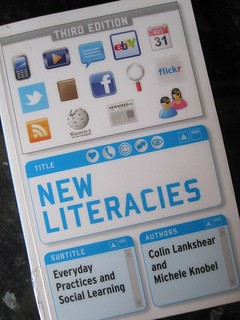
At first glance this topic appears only loosely related to my area of study, however it seems to be one of the seminal works referenced by any text that deals with the online social world. Not one to miss it seems … and so it proved. (In fact to paraphrase Victor Kiam (ca 1970) I liked it so much, I bought the book!)
The notion of ‘literacy,’ or ‘literacies’ to be more precise, in the context of technologies occupies a complex and contested discussion space. As that is (currently) less pertinent to my study, I’ll set it to one side for the moment to focus on other topics covered which clearly were more closely linked. Where I could see an immediate parallel was through the discussion of literacy practices.
Practice a routinised type of activity that consists of several interconnected elements: forms of bodily activities, forms of mental activities, things and their use, a background knowledge in the form of understanding, know how, states of emotion and motivational knowledge.
(as defined by Reckwitz (2002: 250)
It’s easy to see how closely related this is with professional learning, which can be considered a form of practice. A distinction is then made made between literacy practices which may not be wholly observable, to literacy events which are. Events arise from practices and are shaped by them. We use literacy events as an entry point through which to begin to analyse literacy practices. I can see an analogy with professional learning, which may be less visible as a practice, but which we may begin to analyse through observing professional learning events.
I was also struck by the way in which the authors propose the notion of ‘New’ through a transition from one social-economic-technological paradigm to another. From a modern to a postmodern worldview in which ‘elements of an earlier state of affairs are carried over and reshaped to become parts of new configurations’ (Lankshear & Knobel, 2012). Again the analogy with professional learning is palpable; when online social media became available, perhaps professional learning was offered the opportunity to transition to the postmodern? In this table, Lankshear & Knobel (ibid) offer several continua through which the transition can be made, which despite their central theme of literacies, I can immediately see how they could relate to professional learning through social media:
| Modern/industrial paradigm | Postmodern/post-industrial/knowledge society paradigm |
| Singular/Uniform | Multiple |
| Centred | De-centred |
| Monolithic | Dispersed, modular |
| Enclosed/Bounded | Open/Unbounded |
| Localized/Concentrated | Distributed |
| Stable/Fixed | Dynamic/Fluid/Flexible |
| Linear | Non-linear |
| ‘Push’-oriented | ‘Pull’-oriented |
| Individualized | Joint/Collaborative/Collective |
Professional learning can be de-centred, dispersed, dynamic, non-linear and ‘pull’-oriented. However whilst this shift towards what Lankshear and Knobel offer as postmodern is indeed possible through social media, what are the consequences? Is professional learning through social media, like literacies, ‘New’? Will the frameworks used to analyse professional learning in the modern, still be appropriate for the postmodern? Although I can see I’m beginning to get well ahead of myself here, at least it’s served to highlight the need to think carefully about the appropriateness of the frameworks I’ll eventually settle on.
More on New Literacies the next post.
Lankshear, C., Knobel, M., 2012. “New” literacies: technologies and values. Teknokultura. Revista de Cultura Digital y Movimientos Sociales 9, 45–71.

[…] the last post I picked out a couple of the themes from New Literacies that immediately struck me. Here are a few […]
LikeLike